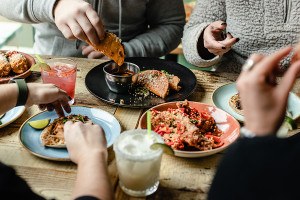Restaurant Review: Sam’s at Louis
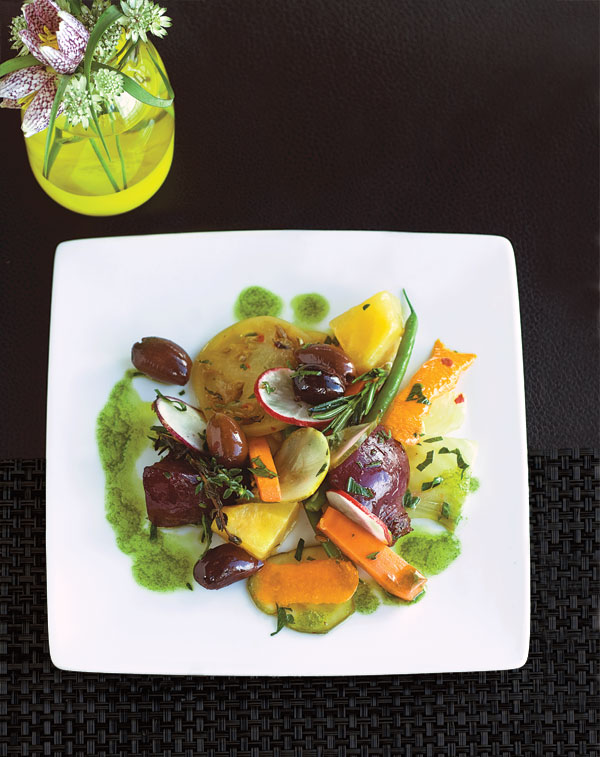
Pickled vegetables and olives, $7. (Photo by Ekaterina Smirnova.)
How is it that Louis, the snootiest, most expensive clothing store in town, has one of the friendliest restaurants? Before the Pearlsteins and Debi Greenberg, who own the place, take out a contract on me: Louis has consistently brought the most forward-thinking design to a clientele that would otherwise have to go to New York or Milan to find it. And for their restaurant at the store, the owners imported Michael Schlow from New York in the mid-’90s, and then, after he left to build his own empire, they provided homes for a number of talented chefs during various incarnations of the eatery. When they decided to move from the Back Bay, they didn’t head for the (Chestnut) hills. Instead, they moved into a brand-new building next to the ICA in the Seaport District, bringing the restaurant with them. Like the stark, modern store it’s attached to, Sam’s at Louis is all metal and glass, and has marvelous views of the water and the skyline. Taking in that scene through the restaurant’s floor-to-ceiling windows — or better yet, outside on its expansive deck — is enough to make you feel like you’re discovering the city anew.
All that glass and steel creates a noisy room, but the casual, friendly service helps make up for it. That’s probably because Esti Parsons is running the show. Parsons, who owns a piece of Sam’s, made her name helping run Rialto and later Radius. Now that she’s operating her own place with her husband, the rock musician Drew Parsons, she’s attempting to combine a sleek look with a homey vibe.
She pulls it off. The user-friendly menu is filled with lots of snacks (like pickled vegetables and olives, $7) and first courses to help you linger on the deck during a late sunset. Some of the dishes, such as the tofu-stuffed zucchini, feel like back-to-the-earth health food. Some, like the much-too-good fries, seem like superior bar food. And some, like the rib-eye steak with haricot verts, have the polish of a downtown restaurant. All of the food, like the place itself, feels comfortable and eager to please.
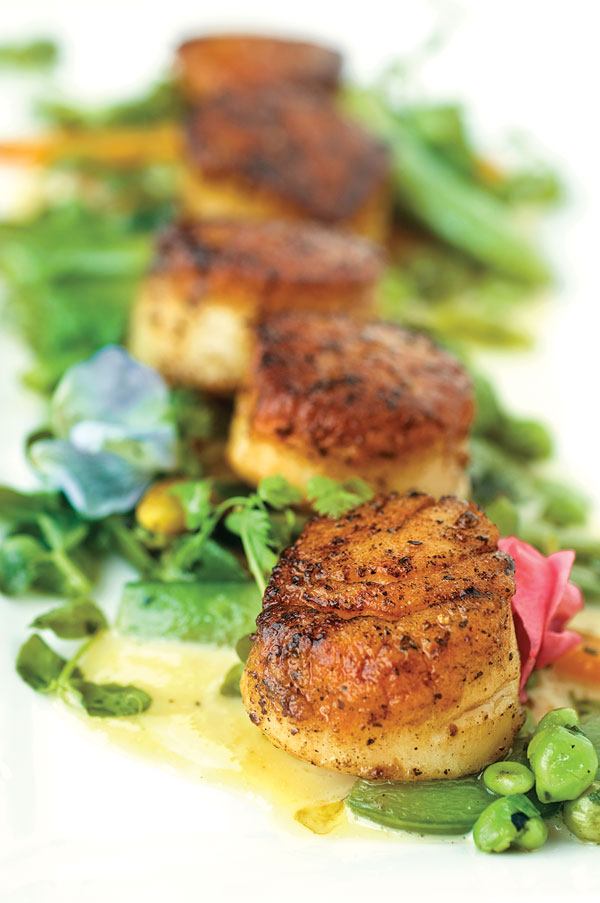
Pan-seared scallops with sugar snap peas, carrots, and ginger aioli, $30. (Photo by Ekaterina Smirnova.)
As would be the product of an enthusiastic, amateur cook, the flavor combinations can be overfreighted, the execution heavy-handed. Executive chef Asia Mei, who was brought on last year to make over the menu, decided to become a cook just as she was graduating from Boston College with a degree in biology and economics. She was fortunate enough to spend four educational years at Hamersley’s Bistro, with its masterly mixture of rustic and polished cooking. She then worked at Sibling Rivalry and, most recently, the Franklin Southie.
Along the way, Mei developed a talent for deep-fat frying. Her fries with fresh herbs ($5) are hand-cut shoestrings dusted with parsley and chives. She serves them only with ketchup, but they were pretty great on their own, even cold, as they arrived a few times. Narragansett beer–battered mixed-vegetable tempura with sherry vinegar aioli ($13) was wonderful, too, in part thanks to the pliable give of the vegetables. And then there was the light and crisp batter, with the soft crunch I’ve tasted in the kitchens of Japanese home cooks.
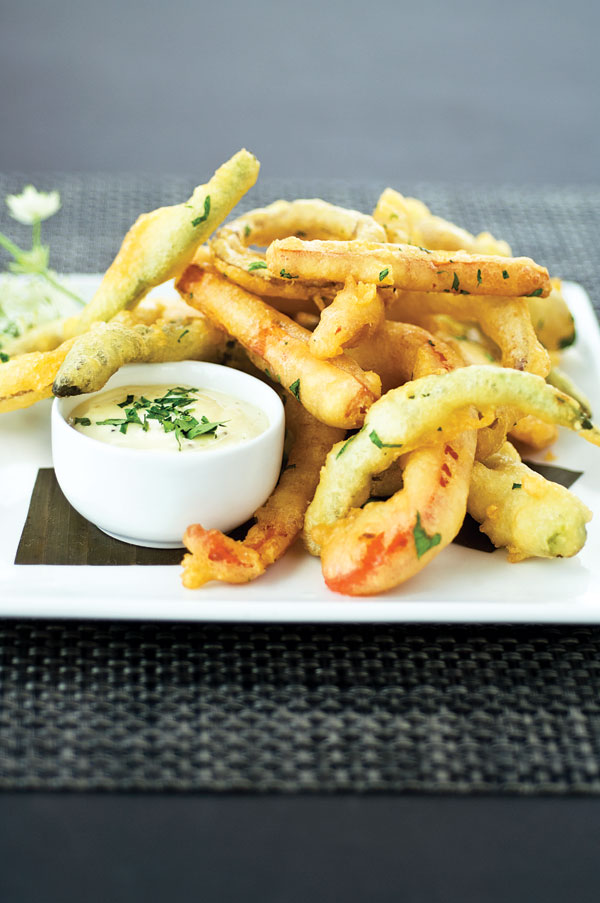
Mixed-vegetable tempura with sherry vinegar aioli, $13. (Photo by Ekaterina Smirnova.)
Duck leg confit ($14) illustrates the time Mei spent in the kitchen of Gordon Hamersley: It was tender, full of flavor, and benefited from a hit of chili flake and a fresh citrus-and-pine-nut salad with pea tendrils. A double portion would make a fine supper paired with some of the crusty, oven-warmed Nashoba Brook Pugliese bread that came to the table with little tubs of butter.
Mei’s salads are farm-fresh, and feature greens from the region’s best growers (Eva’s, Siena Farms, Blue Heron). The asparagus salad ($14) suffered from too much salt and nearly raw asparagus; Mei added bits of tea egg, crunchy rounds of radish, and unnecessary slices of Serrano ham. All that plus the toasted-sesame mayo and tahini on top made for a muddle of flavors, but the greens were so good I kept eating. (Those greens also come in a “local lettuce” salad with seasonal vinaigrette and tempura crisps, $8.) The restrained quinoa salad ($13) was far more successful, with tiny cubes of feta, sections of pink grapefruit, and Marcona almonds. The white and red quinoa was nutty and nice, and there wasn’t so much of it as to make you worry you’re eating health food.
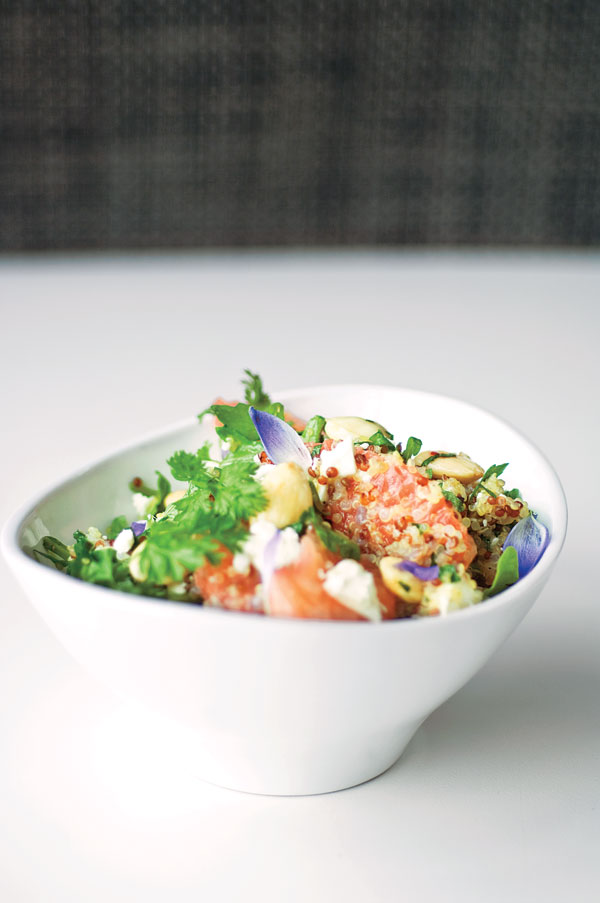
Quinoa salad with feta, grapefruit, and Marcona almonds, $13. (Photo by Ekaterina Smirnova.)
But then there’s the tofu-ricotta-stuffed zucchini with red rice, shaved pecorino, and walnut romesco ($18). The soupy rice would overwhelm even diners who are willing to eat tofu and under-roasted, overgrown zucchini halves. Mei disguises the filling with shallots, garlic, turmeric, and bell peppers — she’s good with tofu, including in a tofu-mushroom burger that had the heft and bite of real meat ($16). Aside from the relatively fashionable romesco, though, the stuffed zucchini seemed to draw the straightest line from Moosewood, 1977 to Boston, 2012.
Often, technique simply fails. The potato gnocchi in hazelnut brown butter ($15) were chewy, rubbery nuggets, served beside braised rabbit meat that was also rubbery but had a pleasant, gamy flavor. The risotto was gummy and cold, both in oversmoked mozzarella arancini ($10) and as a liquidy, tasteless bed for an overbrined, soft-skinned roast chicken that was saved only by a bright mint pesto ($25). The pork milanese ($27) was tough, overbreaded schnitzel; green-garlic mashed potatoes didn’t help offset the heavy dish, nor did the braised dandelion greens or misplaced chive beurre blanc. The giant disk of maitre d’ butter atop the rib-eye seemed misplaced, too.
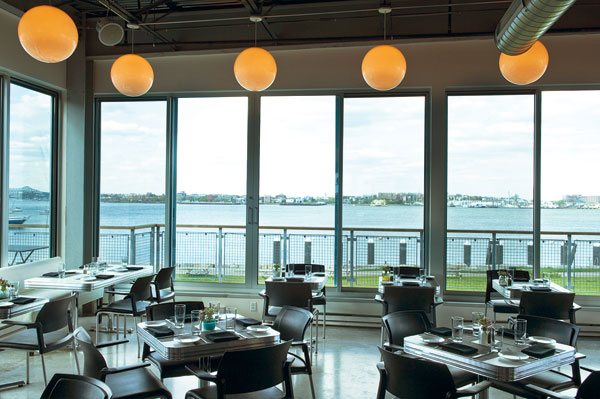
Floor-to-ceiling windows in the dining room provide picturesque views of the water. (Photo by Ekaterina Smirnova.)
But that steak was also giant — a marvelously marbled, deeply flavored cut of meat (though the accompanying haricot verts, much like the asparagus, were almost raw). Stylish and quietly sumptuous, the steak is worth the $44 price tag (share it). Also sumptuous was an entrée of tender pan-seared scallops with sugar snap peas, carrots, pancetta, and ginger aioli ($30).
Desserts take a turn back into uncertain territory. Mei’s East-meets-West bent was nicely displayed in a vanilla yogurt panna cotta with apricot–green tea glaze ($10). The citrusy glaze was refreshing, but so dense it was like Jell-O when someone forgot to put in enough water. Better to stick with the brownie sundae ($10), delightfully gloppy, straightforward, and friendly — much like the stylish and surprisingly welcoming Sam’s itself.
Sam’s at Louis, 60 Northern Ave., Boston, 617-295-0191, samsatlouis.com.
Critic Corby Kummer — an editor at The Atlantic and author of The Pleasures of Slow Food — has been reviewing Greater Boston’s top restaurants in Boston magazine since 1997.

